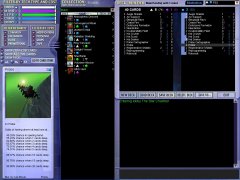|
Interview with Nayantra
 The CMP Game Group (producer of Game Developer magazine, Gamasutra.com, and the Game Developers Conference) established the Independent Games Festival in 1998 to encourage innovation in game development and to recognize the best independent game developers. They saw how the Sundance Film Festival benefited the independent film community, and wanted to create a similar event for independent game developers as well as the student population of game developers. The CMP Game Group (producer of Game Developer magazine, Gamasutra.com, and the Game Developers Conference) established the Independent Games Festival in 1998 to encourage innovation in game development and to recognize the best independent game developers. They saw how the Sundance Film Festival benefited the independent film community, and wanted to create a similar event for independent game developers as well as the student population of game developers.
For this interview I logged on with Nayantra's lead man, Paul Dennen, to learn more about what went into the making of his online card trading game Star Chamber. Once again, the one-man shop proves what can be done, and that the days of garage developers never really did die out.
 Who are you and how were you involved in Star Chamber?
Who are you and how were you involved in Star Chamber?
|
 Congrats on making the IGF finals. How does it feel?
Congrats on making the IGF finals. How does it feel?
|
 What made you decide to enter Star Chamber into the IGF?
What made you decide to enter Star Chamber into the IGF?
|
 How did you get into making games?
How did you get into making games?
|
 What made you go indie rather than try and get a job at an established company?
What made you go indie rather than try and get a job at an established company?
|
 So where and when did the idea for Star Chamber originate?
So where and when did the idea for Star Chamber originate?
|
 Were you drawn towards the idea of Star Chamber as a fan of real life collectible card games like Magic?
Were you drawn towards the idea of Star Chamber as a fan of real life collectible card games like Magic?
|
 What were some of the challenges in designing Star Chamber?
What were some of the challenges in designing Star Chamber?
|
 Was it difficult to add in the whole strategic gameplay layer as well, in addition to the deck gameplay?
Was it difficult to add in the whole strategic gameplay layer as well, in addition to the deck gameplay?
|
 How were the cards conceived? Were a lot of them created initially, and then others added as the game evolved to help with balance issues?
How were the cards conceived? Were a lot of them created initially, and then others added as the game evolved to help with balance issues?
|
 What tools were used to create Star Chamber?
What tools were used to create Star Chamber?
|
 How long was Star Chamber in development for?
How long was Star Chamber in development for?
|
 What was the biggest problem along the road from start to finish? How did you solve it?
What was the biggest problem along the road from start to finish? How did you solve it?
|
 Quality of Life is the new hot topic in the industry today. As indies, we're tasked with our own QoL. What do you do to take off the pressure and keep it fun? Any thoughts on QoL in the industry itself?
Quality of Life is the new hot topic in the industry today. As indies, we're tasked with our own QoL. What do you do to take off the pressure and keep it fun? Any thoughts on QoL in the industry itself?
|
 What advice would you give developers who want to make their own CCG?
What advice would you give developers who want to make their own CCG?
|
 What's next for Star Chamber and yourself?
What's next for Star Chamber and yourself?
|
 Well, good luck at GDC. I'll see you on the Expo floor in March
Well, good luck at GDC. I'll see you on the Expo floor in March
|
Interview conducted by Drew "Gaiiden" Sikora
Click here to post your comments in the forums
|